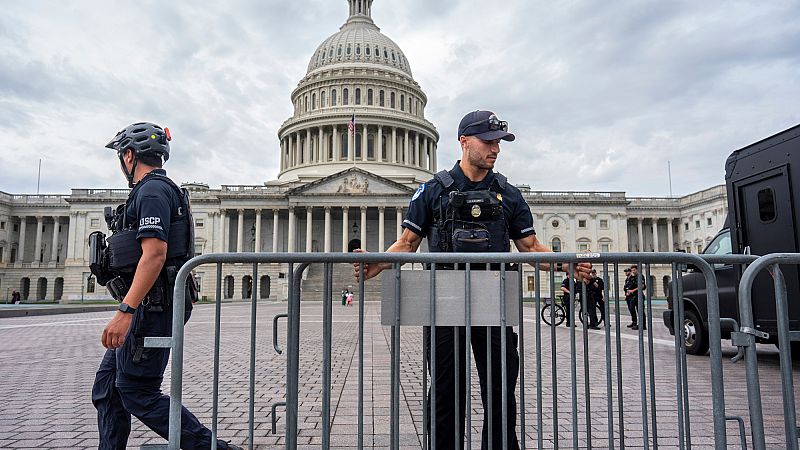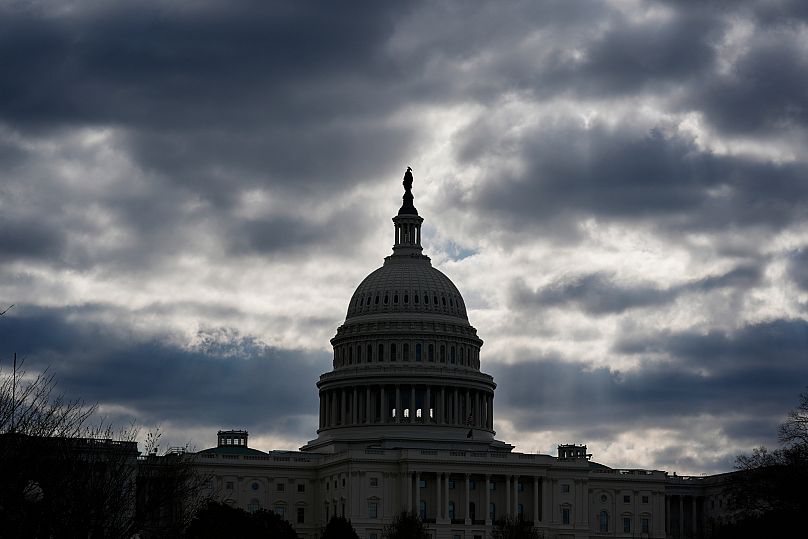Shutdown countdown – what happens when the US government freezes?

Absent a last-minute funding deal between the political parties in Congress, the United States heads toward a shutdown on Wednesday with incalculable consequences for the American economy.
But what exactly does that mean?
The current annual federal budget expires on September 30, 2025. The next budget for fiscal year 2026 must run from October 1, 2025, to September 30, 2026.
Certain public expenditures deemed essential such as social security, air traffic control and the military are considered mandatory and must continue to operate. They are therefore automatically authorised on a permanent basis.
However, other expenditures are considered discretionary and must be formally authorized each year by 12 appropriation bills voted on by Congress – this concerns practically everything else from national parks through farm loans to financial regulators.
If these appropriations bills are not passed, there will be a “shutdown,” which is the suspension of non-essential public services, unless Congress instead passes at least one stopgap measure called continuing resolution that temporarily authorises certain discretionary public expenditures for a specified period of time.
There have been 14 such shutdowns since 1980, according to the Bipartisan Policy Center.
Who is directly concerned?
In the event of a shutdown, civil servants assigned to the provision of these non-essential public services are placed on unpaid leave.
Their colleagues in essential services must work, but without pay. After the shutdown, the salaries of the civil servants concerned, whether furloughed or working, are paid retroactively.
Work resumes as soon as Congress passes the necessary appropriations bills.
In 2023, it took three successive continuing resolutions to avoid a shutdown and ensure the temporary functioning of federal public administrations, each time for a short period.
The problem recurred for fiscal year 2025, which began in October 2024 as it was impossible to vote on the appropriation bills in time.
On September 23, 2024, a continuing resolution was passed, authorising discretionary public spending until midnight on December 20, 2024. On December 21, 2024, a new continuing resolution was passed to allow the financing of discretionary public spending until March 14, 2025.
On March 11, 2025, a new continuity resolution was passed to allow for the financing of discretionary public spending until midnight on September 30, 2025. And this is where we are right now.
Very difficult negotiations in Congress
The problem is that a continuing resolution requires a majority of 60 votes out of 100 in the Senate. In the House of Representatives a simple majority is sufficient.
In the 435-member House, Republicans have an absolute majority of 219 compared to 212 for Democrats and 4 vacancies.
In the Senate, there are 53 Republicans, 45 Democrats, and 2 independents caucusing with the Democrats (Bernie Sanders from Vermont and Angus King from Maine).
Consequently, the approval of a new continuing resolution requires the support of 7 Democratic senators.
But the Democrats are making their support conditional on the maintenance of certain social spending which the Republicans reject.
Democrats have said they will only sign on to a deal that extends tax credits linked to the Affordable Care Act, or Obamacare, that are due to expire at the end of the year. Republicans have claimed that Democrats want to give undocumented migrants hundreds of billions of dollars in healthcare benefits.
What consequences for economic growth?
A suspension of discretionary spending, which accounts for 27% of total federal government spending, has significant consequences.
First, it corresponds to a temporary decrease in the production of public services, which is a component of gross domestic product.
Second, consumption by civil servants on unpaid leave falls sharply, which affects production in other sectors, which is also part of gross domestic product.
For each week of shutdown, economists estimate the decline in real quarterly GDP, relative to its normal level, as between 0.1% and 0.3%. A long month of shutdown would therefore reduce real quarterly GDP by 0.5% to 1.5%.
Since civil servants eventually recover their salaries, which have simply been postponed, there is a certain amount of catch-up in their consumer spending after the shutdown. Much of their paused consumer spending has simply been deferred.
After the shutdown, gross domestic product is therefore slightly higher than normal. However, it is unlikely that all lost consumption will be fully recovered, such as the cost of eating lunch out that furloughed civil servants would have incurred if they had been working, their transportation costs from home to the office, etc.
The shutdown would mean a suspension of payments by public administrations to their suppliers. Many companies would be in difficulty and, for some, jobs could be at risk. Some bankruptcies would even be possible if the shutdown lasted for a long time. All of this would exacerbate the decline in gross domestic product.
Looming trouble on financial markets
Interest rates on US government bonds would rise, as investors would consider them to be higher risk. A shutdown would therefore heighten fears of a US default on its sovereign bonds in 2025, because it would be very difficult to reach an agreement on raising the debt ceiling by December.
Failure to reach an agreement on the debt ceiling, which would prevent the government from taking on new net borrowing, would have economic consequences far greater than those of a shutdown.
Higher interest rates on public debt could lead to a widespread increase in credit rates, particularly mortgage rates, exacerbating the real estate crisis and thus the contraction in gross domestic product.
Other consequences: The shutdown would prevent the National Flood Insurance Program, which is managed by the government and provides half of all flood insurance policies in the US, from operating.
Potential homebuyers looking for such insurance to obtain their loans would be stymied. This would further depress the real estate market and exacerbate the negative impact on economic growth.
In addition, the shutdown would compromise the availability of statistical indicators that are necessary to guide investors in the financial markets and the Federal Reserve's monetary policy.
A large part of the statistics are produced by public agencies whose activities would be suspended.
In sum, stock prices could fall due to higher interest rates, lower activity, and statistical opacity. Whether Washington's political brinkmanship would go that far we'll know on Wednesday.
Today


